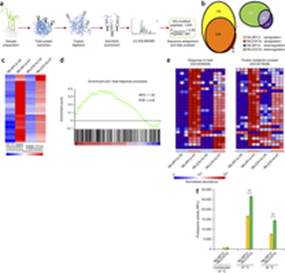我科学家成功克隆水稻抗高温基因


由中科院上海生科院植物生理生态研究所植物分子遗传国家重点实验室林鸿宣院士领衔的研究团队,率先从作物中成功克隆了控制高温抗性的数量性状基因位点(QTL),相关研究成果18日在线发表在国际顶级遗传学杂志《Nature Genetics》上。
随着全球气候变化,极端高温天气越来越频繁出现,使水稻产量的稳定遭受威胁。发掘作物抗高温基因资源,培育抗高温新品种,具有重要战略意义。10多年前,林鸿宣团队就开始关注作物抗高温研究。在他的指导下,博士生厉新民通过遗传分析和定位克隆,成功分离克隆到了控制非洲稻高温抗性的主效QTL-高温抗性1号基因(TT1)。研究表明,水稻面临高温胁迫时,其细胞内的蛋白质会大量失活变性,影响细胞内正常的生命活动,严重时会造成细胞破裂,水稻植株枯萎死亡。来源于非洲稻的基因TT1可以在高温时快速启动响应,参与降解变性蛋白的“环卫系统”,使植物细胞及时有效地清除“垃圾”,从而增强植物的抗热性。
林鸿宣说,TT1是率先成功发掘到的重要基因,为作物抗高温改良提供了宝贵资源。TT1在草坪草、大白菜等十字花科植物的抗高温育种中也有广泛应用潜力。(来源:光明日报 颜维琦 曹继军)
Natural alleles of a proteasome α2 subunit gene contribute to thermotolerance and adaptation of African rice
Abstract Global warming threatens many aspects of human life, for example, by reducing crop yields. Breeding heat-tolerant crops using genes conferring thermotolerance is a fundamental way to help deal with this challenge. Here we identify a major quantitative trait locus (QTL) for thermotolerance in African rice (Oryza glaberrima), Thermo-tolerance 1 (TT1), which encodes an α2 subunit of the 26S proteasome involved in the degradation of ubiquitinated proteins. Ubiquitylome analysis indicated that OgTT1 protects cells from heat stress through more efficient elimination of cytotoxic denatured proteins and more effective maintenance of heat-response processes than achieved with OsTT1. Variation in TT1 has been selected for on the basis of climatic temperature and has had an important role in local adaptation during rice evolution. In addition, we found that overexpression of OgTT1 was associated with markedly enhanced thermotolerance in rice, Arabidopsis and Festuca elata. This discovery may lead to an increase in crop security in the face of the ongoing threat of global warming.
原文链接:http://www.nature.com/ng/journal/vaop/ncurrent/full/ng.3305.html

